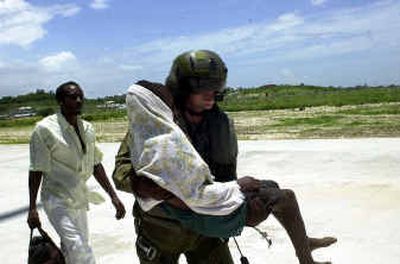Caribbean flooding hits kids hardest

JIMANI, Dominican Republic – Children stand naked amid their shattered homes, crying for help. Others wander the streets in their underwear, desperately searching for food.
It has been a horrible few days in this impoverished community along a line of mountains bordering Haiti, where the deadliest flooding in a generation on the Caribbean isle of Hispaniola had claimed at least 1,100 lives as of Saturday.
But no group has suffered more than the children. Scores are homeless or without their families.
Aid workers have begun telling residents receiving food assistance to take wandering children into their care until a program can be devised to find their families.
In some cases, children are suffering a heavy emotional toll as loved ones leave them to fend for themselves in food and water lines.
“There’s not much we can do about the children,” said the Rev. Jose Ramon de la Cruz, a local priest who is running the food-distribution effort here. “Our first priority to making sure everyone has food and shelter. . . .
“Right now, we are trying to get food aid out to as many people as we can, and we hope families will look out for children they know or care about.”
Of the 400 or so people who died in Jimani from Monday’s floods, nearly one in five was a child.
Scanning the mud-packed streets, one can see small children sitting under trees, many by themselves, eating whatever food they can find. Or begging to strangers.
One boy, probably about 5, wandered around in his dusty underpants for about an hour until a woman, speaking French, grabbed him by the arm and pulled him next to a small shack. About 20 minutes later, the boy was wandering around again.
Cueto Medrano, 12, sat outside a warehouse where food is being stored for distribution. “I am just staying right here because this is where the food is,” said Medrano.
Wearing a soiled T-shirt and mud-soaked pants, Medrano said he lost an aunt in the heavy flooding.
When he needs to sleep, he heads to a friend’s house and lies down on their dirt floor. “I’ve also been helping pass out food and eating some on the way,” he explained, dusting a layer of dried mud from his pants leg.
“I’ll be all right,” Medrano insisted. “There’s some in town who don’t have anything to eat right now.”
Donny Santana, director of the Dominican Civil Defense, said most of the families directly affected by the flooding had children.
About 75 children may have died, he estimated. That number will surely rise in the days ahead, he said.
“We are having difficulty accounting for everyone,” Santana said. “We just can’t find some people who were swept away.”
Officials had feared more heavy rains would form over Hispaniola on Saturday. But instead, the sun baked down, sending temperatures to 95 degrees. While the rains did not come, a small earthquake shook the island. Officials did not immediately report any injuries or damage.
The official toll of 1,104 dead in the Dominican Republic and Haiti, conservatively estimated from recovered bodies, is expected to rise, the Associated Press reported.
Secretary-General Cesar Gaviria of the Organization of American States called it “one of the worst natural disasters to hit the Caribbean.”